2018: A Year of Winning Musical Collaborations Across the City
In 2018, the key players of San Diego’s classical music scene struck gold by collaborating with each other. The San Diego Symphony set a magnificently high bar with its January “It’s About Time” festival, a month-long celebration of contemporary music that focused on the many ways percussion and percussionists have shaped avant-garde music.
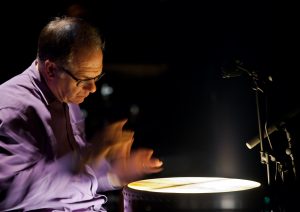
Steven Schick [photo (c) Bill Dean]
With the San Diego Symphony at the Jacobs Music Center, Schick proved a spellbinding soloist in Roberto Sierra’s massive percussion concerto “Con madera, metal y cuero” performing on a concert that introduced Venezuelan conductor Rafael Payare to the city. (A few months later Payare was announced as the orchestra’s newly appointed Music Director Designate.) When Schick conducted the orchestra two weeks after his Sierra performance, he introduced both Missy Mazzoli’s “River Rouge Transfiguration” from 2013 and Toru Takemitzu’s 1990 “From me flows what you call Time,” an astonishing orchestral work featuring five percussion soloists.
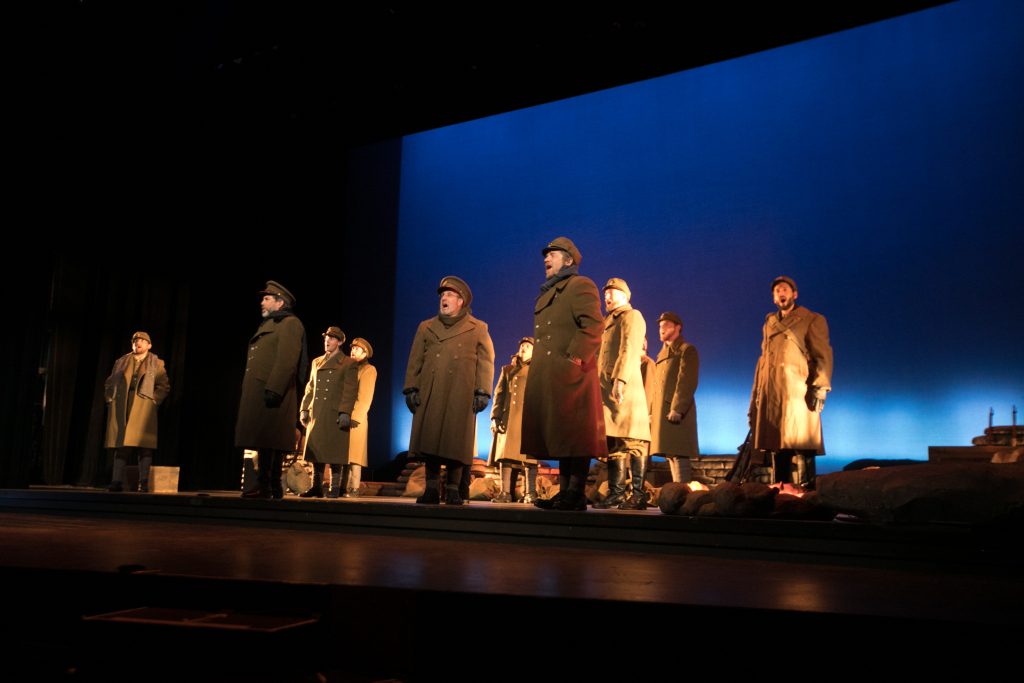
Cast of All Is Calm [photo courtesy of San Diego Opera]
On our two major university campuses, collaboration brought two major new works to life. UCSD Professor
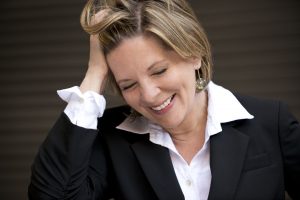
Susan Narucki [photo courtesy of the performer]
Across town earlier in October, Joseph Martin Waters, San Diego State University Professor and founder of the avant-garde music ensemble Swarmius, heard his long-awaited alto saxophone concerto “Tathata Garden” premiered by the San Diego State University Symphony Orchestra under Michael Gerdes with Swarmius member and music faculty colleague Todd Rewoldt as soloist. A welcome addition to the slender catalogue of saxophone concertos, Waters’ new work proved an engaging showcase for Rewoldt’s virtuoso flair and velvet sonority.
That busy month of October also provided a thrilling onstage merger of the visiting Mariinsky Orchestra from St. Petersburg and the San Diego Symphony under the direction of Valery Gergiev performing Dmitri Shostakovich’s demanding Seventh Symphony, “Leningrad.” It would be difficult to imagine a more winning combination than the sterling strings of this historic Russian orchestra and San Diego’s consummate woodwind sections, and their performance of Shostakovich’s great symphony under Gergiev exceeded expectations.
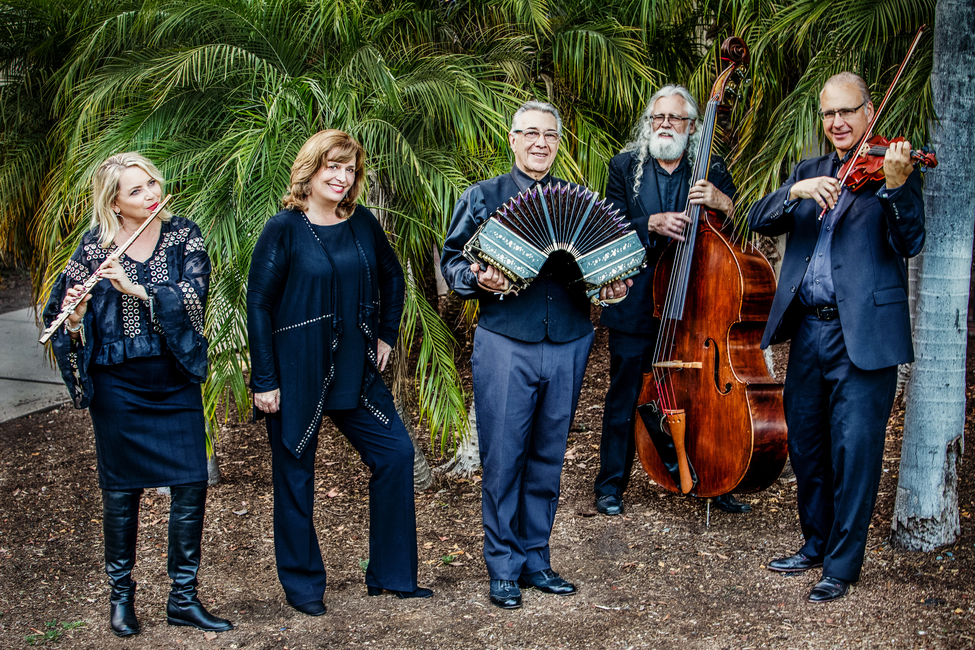
Beth Ross Buckley, Dana Burnett, Raul Jaurena, Jeff Pekarek & David Buckley [photo courtesy of Camarada]
In January, Art of Élan presented a concert of new chamber works by local composers surrounded by the San Diego Art Institute’s engaging installation “The Language of Things,” creations of the San Diego based artist Romero-Molina. Unique to this concert program, however, was the combination of a Lei Liang premiere, “Petal by Petal, Leaf by Leaf,” and several new pieces by young student composers mentored by Art of Élan’s National City outreach program, the “Young Artists in Harmony” residency. The sophisticated communication of these student works amazed me and actually complemented Liang’s predictably elegant trio for flute, viola, and harp. Most of our music organizations maintain laudable outreach programs to bring classical music to underserved communities, but under the astute leadership of Kate Hatmaker, Art of Élan has also involved the National City students in the art of composition and boldly presented their handiwork in the company of new music by an internationally acclaimed composer. If there are other San Diego musical outreach programs working at this level of engagement, I would love to know about them!
If I were handing out awards for excellence in programming, my first choice would be Sameer Patel’s smashing 20th-century modernist collage that he selected for his guest stint conducting the La Jolla Symphony in May. To “Eating Flowers,” the 2016 concerto for orchestra by the American composer Hannah Lash, Patel added Schoenberg, Stravinsky, Takemitsu, and Messaien. Not only did the orchestra rise admirably to this daunting challenge, but the works complemented each other in surprising ways—Messiaen’s pastel harmonies in “Un sourire” balanced the grit of Schoenberg’s Five Pieces for Orchestra. And Patel did not have to throw in a Dvorak symphony to accommodate the conservative tastes of the donors in the grand tier section.
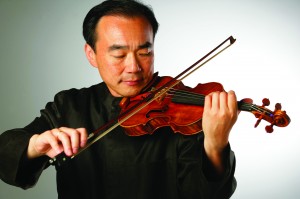
Cho-Liang Lin [photo courtesy of La Jolla Music Society]
The award for best performance of a work of standard repertory—the reader has no doubt gleaned from this piece that standard repertory is not exactly my passion—would easily go to pianist Conrad Tao’s spectacular account of Tchaikovsky’s First Piano Concerto with the San Diego Symphony in November. As an aside, I would note that Tao is also an accomplished composer. On the local opera scene, I would pass out an award to Peter Kozma’s Opera NEO for successfully reviving Mozart’s Idomeneo, a worthy early Mozart opera with a musically rich score but a plot that lacks some of the clever turns of the three Mozart-Da Ponte collaborations that are incessantly repeated by the major companies.
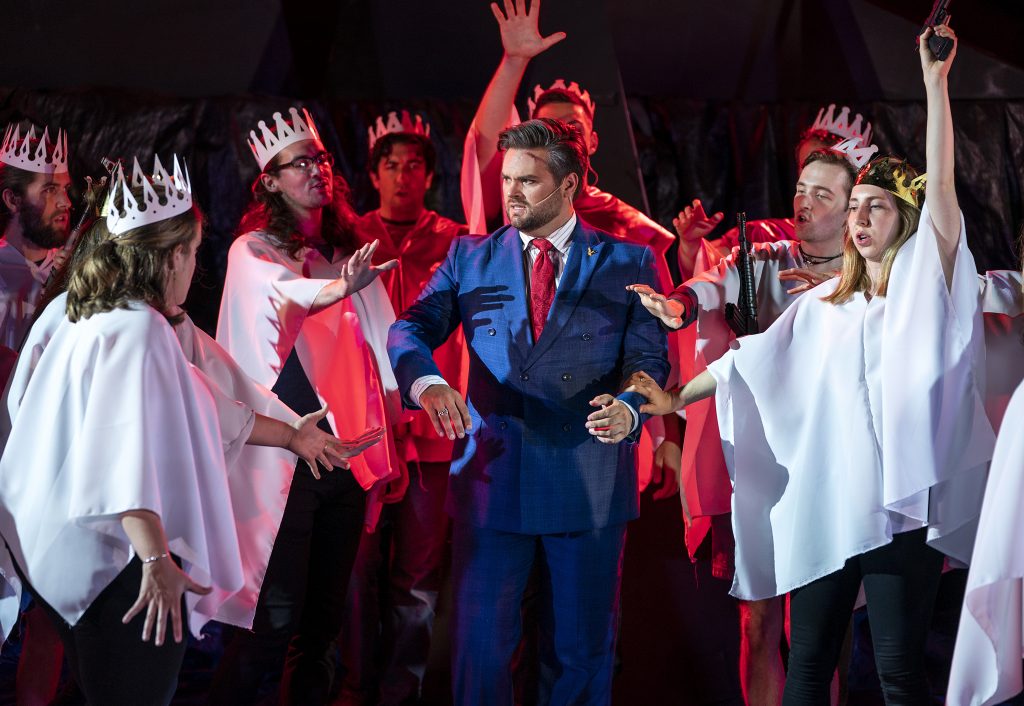
Dane Suarez and his Court in Opera NEO’s Idomeneo [photo (c.) Gary Payne]
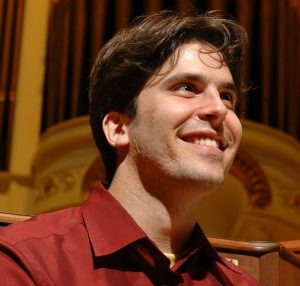
Raúl Prieto Ramírez [photo courtesy of the artist]
If 2018 proved to be a rich year for musical performance in San Diego, I suggest that 2019 holds even greater promise. The La Jolla Music Society will open its new venue, the Conrad, in downtown La Jolla in April, and in the fall, Rafael Payare takes command of the San Diego Symphony as its Music Director. Great expectations, to say the least!

Ken Herman, a classically trained pianist and organist, has covered music for the San Diego Union, the Los Angeles Times’ San Diego Edition, and for sandiego.com. He has won numerous awards, including first place for Live Performance and Opera Reviews in the 2017, the 2018, and the 2019 Excellence in Journalism Awards competition held by the San Diego Press Club. A Chicago native, he came to San Diego to pursue a graduate degree and stayed.Read more…

Re All Is Calm at the Balboa Theatre, the musical performance was most enjoyable. However, with no supertitles, it was almost impossible to enjoy the letters and poetry. Still awaiting a response from San Diego Opera as to why.
La Jolla Symphony played “From me flows what you call Time” several years ago. I was very happy to be able to hear it, and see it, again